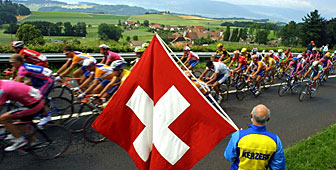Road to recovery?

Switzerland's biggest cycling race, the Tour de Suisse, got underway in Lucerne on Tuesday - a test not only for the world's top cyclists, but also for the country's new anti-doping laws.
Starting off from Lucerne’s national transport museum and ending at the Expo.02 exhibition in Biel with visits to Europe’s largest waterfall and the fictional resting place of Sherlock Holmes along the way, the race’s 66th edition certainly has a touristic feel to it.
But with 1,451 kilometres of tarmac to cover in ten gruelling days the riders are unlikely to be taking much time out for sightseeing.
“I think the highlight of this year’s Tour will definitely be the fifth stage from Meiringen and back, with three big climbs over the Grimsel, Furka and Susten passes,” Tour de Suisse organiser Marc Biver told swissinfo with an almost sadistic grin.
“I think the mountain finish in Verbier on the very next day should also be interesting,” Biver added, pointing out that this year’s tour has a greater height difference than either of the previous editions that he has organised.
Temptation to cheat
Followers of cycling are only too aware, however, that as the challenge gets harder, the temptation to cheat grows larger. Confidence in the sport has been rocked in recent years by major scandals involving the use of performance-enhancing drugs.
Among those tempted, and caught, have been a number of Swiss cyclists including most famously Alex Zülle, who was banned for seven months after he admitted taking EPO and growth hormones during the 1998 Tour de France.
The four-year ban handed down to Swiss youngster Stefan Rütimann last week, following his second doping offence, served as a reminder that the problem has not yet gone away.
Although Swiss stars have not proven immune to the lure of performance-enhancing drugs, the Tour de Suisse itself has so far avoided the type of scandals that have stunned the Tour de France and the Giro d’Italia.
Tighter legislation
Critics have argued that the Swiss tour has only avoided such negative headlines because of the country’s more tolerant doping laws, which previously prevented police from making mass raids on team hotels.
However new legislation, which came into force at the start of this year, have increased police powers in regard to doping offences, bringing the law more into line with those in France and Italy. Under the new regulations, it will not only be cheating cyclists who could find themselves facing the Swiss courts, but also those who help supply the drugs or help conceal their use.
“I am very happy with the new law,” Swiss Olympic Association doping expert Oliver Hintz told swissinfo. “Now the authorities have a basis on which to act if they have reasons for suspicion.”
Raids unlikely?
Hintz is confident however that the need for reasonable suspicion on the part of the Swiss police will not lead to the sort of random raids frequently witnessed in Italy, raids which some have criticised for contravening the rights of privacy and dignity.
“I’m almost sure we won’t see that (in Switzerland),” Hintz insisted. “The fight against doping is not supposed to be led by the demands of the media.”
Hopes for a clean race are unsurprisingly shared by the Tour de Suisse organisers.
“I just want a race free of doping problems, free of accidents and blessed with good weather,” Marc Biver told swissinfo.
Such wishes would seem simple if only professional cycling hadn’t become so complicated.
swissinfo

In compliance with the JTI standards
More: SWI swissinfo.ch certified by the Journalism Trust Initiative
You can find an overview of ongoing debates with our journalists here. Please join us!
If you want to start a conversation about a topic raised in this article or want to report factual errors, email us at english@swissinfo.ch.